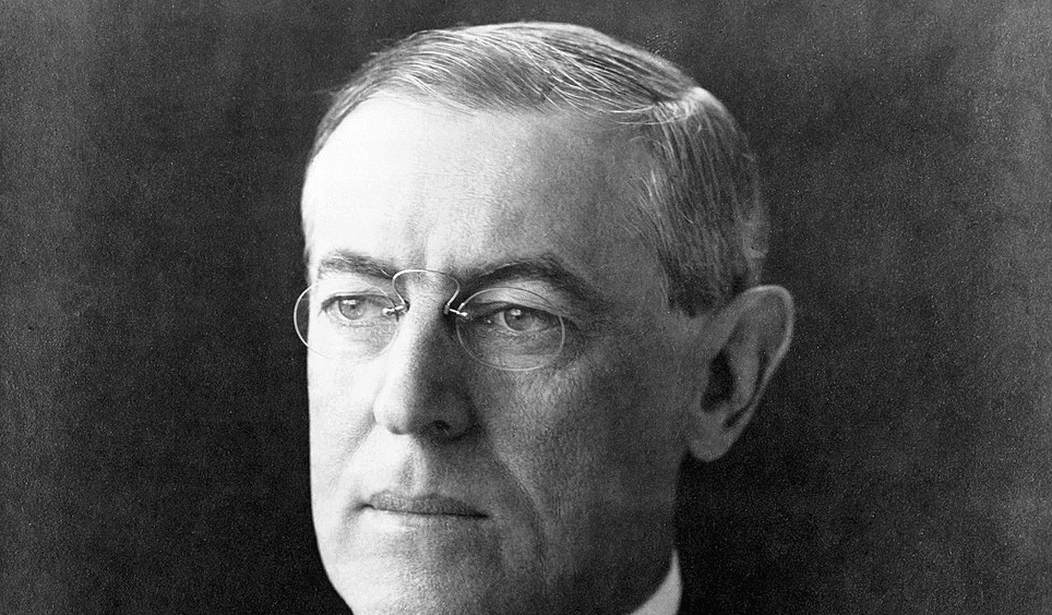If their objective is really to destroy monuments to slave owners (which it isn’t, of course: the goal is to obliterate American history in general and America itself), the Antifa rioters who are busy tearing down statues all over the United States have demonstrated more than once that they have only the most glancing grasp of the history against which they’re at war. They recently tore down a statue of Ulysses S. Grant, the Union general who, more than any other single person, deserves credit for defeating the Confederacy and winning the Civil War. But so far, a president who actually did foster racial hatred and injustice has not been targeted: Woodrow Wilson, who was president from 1913 to 1921.
Wilson remains a hero of “progressive” internationalists and a pioneer of American interventionism. As Rating America’s Presidents: An America-First Look at Who Is Best, Who Is Overrated, and Who Was An Absolute Disaster shows, Wilson articulated the messianic foreign policy objective that has prevailed in the State Department ever since his day. America’s goal in World War I, he declared, was not to protect American interests or indeed to do anything for the benefit of the United States at all; rather, it was to “make the world safe for democracy.”
But besides this savior-complex globalism, Wilson had an even darker side. He was born on December 28, 1856, in Staunton, Va., to a Presbyterian minister and his wife, and was still a baby when his family moved to Augusta, Georgia. One of his earliest memories was hearing, at the age of three, that Abraham Lincoln had been elected president and civil war was on the horizon. When it came, young Woodrow saw his father’s church turned into a hospital for Confederate soldiers wounded in the Battle of Chickamauga and other Civil War battles.
It is unlikely that Wilson’s father was unwilling to turn over his church for this service. His parents were fervent supporters of the Southern cause, and it is clear that they imparted their sentiments to their son. Even after Woodrow Wilson moved north in the course of his academic career, he retained the racist attitudes he learned in his youth. When he became president, he made them U.S. government policy.
In 1915, the notorious film The Birth of a Nation became the first motion picture to get a screening in the White House; the film portrayed the Ku Klux Klan as heroes, denigrated blacks in numerous ways, and quoted Wilson as a respected authority. Wilson was quoted decrying the supposed “policy of congressional leaders” to “put the white South under the heel of the black South.” In response, Wilson went on, as quoted in the film: “The white men were roused by a mere instinct of self-preservation… until at last there had sprung into existence a great Ku Klux Klan, a veritable empire of the South, to protect the Southern country.”
The showing of The Birth of a Nation was indicative of Wilson’s attitudes: during his administration, government departments in Washington were segregated. Wilson abandoned the interests of the American people in his embrace of racism and segregation, which only prolonged the injustices done to black Americans and contributed to making the race issue the national trauma and a bleeding sore that will not heal to this day. As he was also the first internationalist president, who put the interests of the world ahead of the interests of his country, his presidency was an unmitigated disaster for the country he was twice elected to govern.
In that first election, Wilson only triumphed because the Republican Party was bitterly split between the supporters of Theodore Roosevelt and William Howard Taft. During Roosevelt’s presidency from 1901 to 1909, he several times demonstrated his desire to heal the nation’s racial wounds. Roosevelt was friendly with the black American educator Booker T. Washington; just weeks after taking office, the new president invited Washington to dine with him at the White House.
Many Southerners were enraged; Senator Ben Tillman of South Carolina said that Roosevelt’s action would require Southern whites to kill a thousand blacks to remind them of their subservient place in society. Roosevelt was dismayed by the reaction, and never invited Washington to dinner again, although he did consult with him at the White House. In 1905, President Roosevelt visited the Tuskegee Normal and Industrial Institute for the Training of Colored Young Men and Women, which Washington had founded, and he served on its board of trustees.
But whatever progress this represented was ended by Woodrow Wilson, in much the same way as the present racial tensions were ginned up by Barack Obama during his supposedly post-racial administration. So why haven’t the destroyers targeted Wilson? Maybe because they realize how damaging he was to America, and damaging America is just what they want to do.
Robert Spencer is the director of Jihad Watch and a Shillman Fellow at the David Horowitz Freedom Center. He is author of 21 books, including the New York Times bestsellers The Politically Incorrect Guide to Islam (and the Crusades) and The Truth About Muhammad. His latest book is Rating America’s Presidents: An America-First Look at Who Is Best, Who Is Overrated, and Who Was An Absolute Disaster. Follow him on Twitter here. Like him on Facebook here.










Join the conversation as a VIP Member